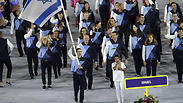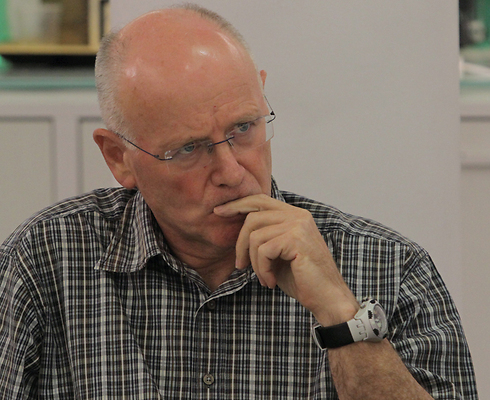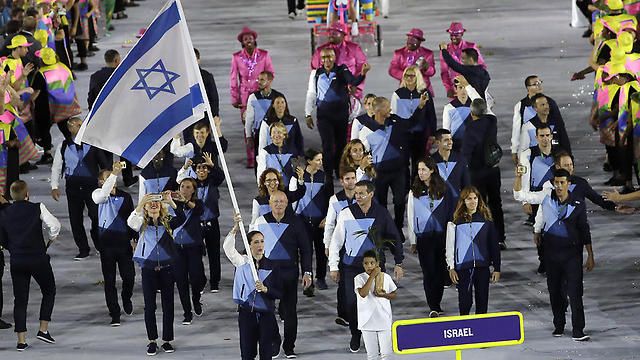
Lebanese Olympics team stops Israelis from boarding shared bus
Sailor Udi Gal, a member of Israel's Olympics delegation, says members of the Lebanese delegation refused to let the Israelis ride the bus with them to the Maracana stadium, where the opening ceremony was to take place.
“The 2016 Olympics – a disgrace!!” wrote Gal in a Facebook post. “(When) Israel’s Olympic delegation got ready to board the bus for the opening ceremony, it turned out the bus was shared with the Lebanese delegation. Once the members of the Lebanese delegation realized they were (sharing the bus) with the Israeli delegation, they asked the driver to close the door, with their delegation leader heading (the effort).”
Gal claimed that the organizers tried to calm things down. “The organizers tried to split us up to different buses, something which was not possible security and representation-wise,” he wrote, “I insisted and we insisted that we get on the intended bus, and if the Lebanese don’t want (to ride with us), they are welcome to get off (of it). The bus driver opened the door, but this time the head of the Lebanese delegation blocked the entrance with his body. The organizers tried to prevent an international incident and sent us aside to a special (vehicle).”
Gal was surprised the organizers gave in to the pressure, writing, “How is it that they let something like this happen, and on the opening night of the Olympic Games? Isn’t this the opposite of what the Olympics represent and (don’t the actions by the Lebanese delegation) work against it? I cannot describe the way I feel. I’m enraged and shocked by this event.”
Lebanese delegation head, Salim al-Haj Nakoula gave the Lebanese press his version of the story on Saturday. In an interview given to the An-Nahar newspaper, Nakoula claimed that each delegation was to have its own bus. “There are over 250 buses dedicated to transporting the delegations from the Olympic village to the opening ceremony. After we boarded Bus 22, which was dedicated to the Lebanese delegation, I was surprised by the Israeli delegation’s approaching and wanting to get on the bus with us,” he said.
“I asked the driver to shut the door, but the guide who was there with the Israeli delegation prevented him from doing so. I had to stand at the entrance to the bus to block it, and prevent the (Israeli) delegation from coming in,” Nakoula said. He claimed that the Israelis were trying to cause an incident on purpose. “They have a bus of their own like all delegations. Why did they want to get on the Lebanese delegation's bus?” he asked.
Head of the Israeli delegation to the Rio 2016 games, Gili Lustig, responded to Nakoula by saying, “The organizing committee was the one that determined the travel arrangements, and which bus we would take to the ceremony. The organizing committee saw the rude behavior of the Lebanese delegation head and immediately provided an alternate bus. The behavior of the Lebanese delegation head is in conflict with the Olympic truce. As far as we are concerned, the whole thing is behind us and we’re ready for the competitions.”
Lusting mentioned that the organization committee apologized for the incident. “They pointed us at a bus with ten Lebanese people in it. It was an unwise decision from the start and it’s too bad they didn’t think of that before. This king of incident could have been prevented. We certainly don’t believe in boycotts. The committee’s people tried to talk to the Lebanese, who refused to accept us. It should be said that the busses were joint: They’d fill a bus, and move on. They asked that we not make a scene ahead of the opening ceremony.”

Lebanese Minister of Youth and Sport Abdel Motaleb Hannawi told a Lebanese news site that this was not the first time Israel has attempted to embarrass a Lebanese delegation in this kind of circumstance. He praised the delegation’s behavior, Nakoula’s specifically. “His stance was principled and patriotic,” he said.
Nakoula became the hero of the day in Lebanon after the incident was publicized. The Al Mayadeen and Al-Manar news networks, both associated with Hezbollah, gave Nakoula praise, with the latter also interviewing him. Hezbollah supporters and officials praised him on social media, with one Al-Manar broadcaster tweeting, “The Israelis were sent away from the bus because normalization (with Israel) is not to be had in any form, and because the Lebanese identity (is that of) resistance. Be proud to be Lebanese.”
Nadav Zenziper, Oren Aharoni, and Roi Kais contributed to this report.












